Suzuki Ignis vs Hyundai Bayon – Differences & prices compared
Compare performance, boot space, consumption and price in one view.
Find out now: which car is the better choice for you – Suzuki Ignis or Hyundai Bayon?
The Suzuki Ignis (SUV) comes with a Petrol MHEV engine and Manuel or Automatic transmission. In comparison, the Hyundai Bayon (SUV) features a Petrol engine with Manuel or Automatic transmission.
When it comes to boot capacity, the Suzuki Ignis offers 267 L, while the Hyundai Bayon provides 411 L – depending on how much space you need. If you’re looking for more power, decide whether the 83 HP of the Suzuki Ignis or the 100 HP of the Hyundai Bayon suits your needs better.
In terms of consumption, the values are 4.90 L per 100 km for the Suzuki Ignis, and 5.40 L for the Hyundai Bayon.
Price-wise, the Suzuki Ignis starts at 15600 £, while the Hyundai Bayon is available from 20100 £. Compare all the details and find out which model fits your lifestyle best!
Suzuki Ignis
The Suzuki Ignis is a compact car that stands out with its unique blend of small SUV aesthetics and city-friendly dimensions. Its playful and distinctive design, combined with a practical and elevated driving position, makes it an appealing choice for urban dwellers seeking versatility without compromising on style. Inside, the Ignis offers a surprisingly spacious cabin with innovative storage solutions, making it ideal for those who need a functional yet characterful vehicle.
details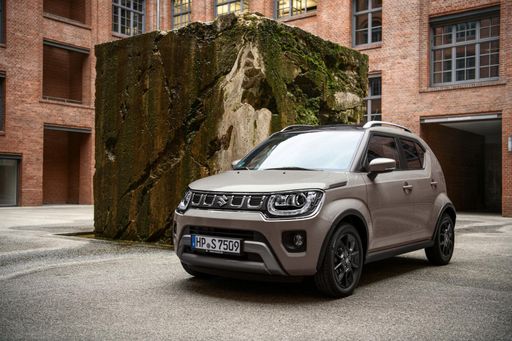 @ Suzuki
@ Suzuki
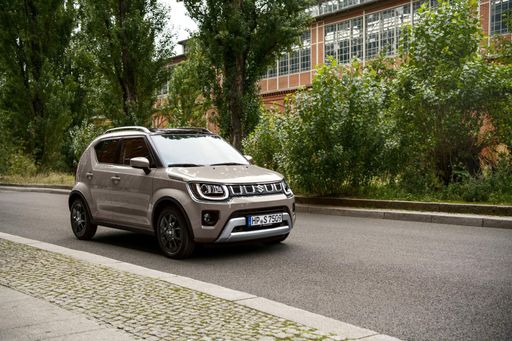 @ Suzuki
@ Suzuki
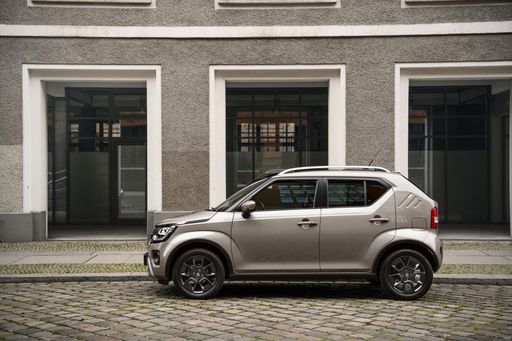 @ Suzuki
@ Suzuki
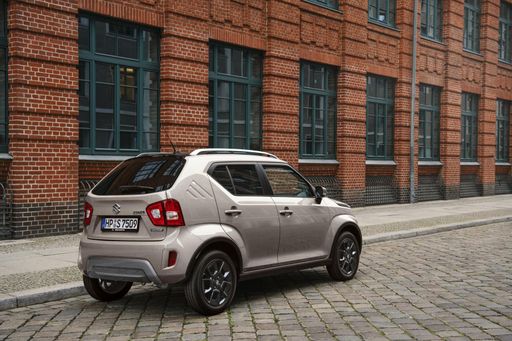 @ Suzuki
@ Suzuki
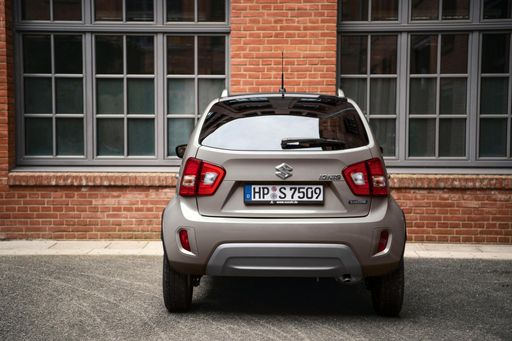 @ Suzuki
@ Suzuki
Hyundai Bayon
The Hyundai Bayon is a compact crossover that effortlessly merges practicality with modern design. Its sleek exterior and spacious interior make it an ideal choice for urban settings and longer journeys alike. With a focus on comfort and connectivity, this vehicle provides a smooth driving experience paired with advanced technology features.
details @ hyundai.news
@ hyundai.news
 @ hyundai.news
@ hyundai.news
 @ hyundai.news
@ hyundai.news
 @ hyundai.news
@ hyundai.news
 @ hyundai.news
@ hyundai.news

|

|
|
|
|
Costs and Consumption |
|
|---|---|
|
Price
15600 - 19500 £
|
Price
20100 - 25800 £
|
|
Consumption L/100km
4.9 - 5.4 L
|
Consumption L/100km
5.4 - 5.5 L
|
|
Consumption kWh/100km
-
|
Consumption kWh/100km
-
|
|
Electric Range
-
|
Electric Range
-
|
|
Battery Capacity
-
|
Battery Capacity
-
|
|
co2
110 - 122 g/km
|
co2
124 g/km
|
|
Fuel tank capacity
30 - 32 L
|
Fuel tank capacity
40 L
|
Dimensions and Body |
|
|---|---|
|
Body Type
SUV
|
Body Type
SUV
|
|
Seats
4 - 5
|
Seats
5
|
|
Doors
5
|
Doors
5
|
|
Curb weight
935 - 995 kg
|
Curb weight
1170 - 1195 kg
|
|
Trunk capacity
204 - 267 L
|
Trunk capacity
411 L
|
|
Length
3700 mm
|
Length
4180 mm
|
|
Width
1690 mm
|
Width
1775 mm
|
|
Height
1605 mm
|
Height
1500 mm
|
|
Payload
335 - 395 kg
|
Payload
460 - 465 kg
|
Engine and Performance |
|
|---|---|
|
Engine Type
Petrol MHEV
|
Engine Type
Petrol
|
|
Transmission
Manuel, Automatic
|
Transmission
Manuel, Automatic
|
|
Transmission Detail
Manual Gearbox, CVT
|
Transmission Detail
Manual Gearbox, Dual-Clutch Automatic
|
|
Drive Type
Front-Wheel Drive, All-Wheel Drive
|
Drive Type
Front-Wheel Drive
|
|
Power HP
83 HP
|
Power HP
100 HP
|
|
Acceleration 0-100km/h
12.7 - 12.8 s
|
Acceleration 0-100km/h
11.3 - 12.4 s
|
|
Max Speed
155 - 165 km/h
|
Max Speed
176 - 179 km/h
|
|
Torque
107 Nm
|
Torque
172 - 200 Nm
|
|
Number of Cylinders
4
|
Number of Cylinders
3
|
|
Power kW
61 kW
|
Power kW
74 kW
|
|
Engine capacity
1197 cm3
|
Engine capacity
998 cm3
|
General |
|
|---|---|
|
Model Year
2020
|
Model Year
2024
|
|
CO2 Efficiency Class
C, D
|
CO2 Efficiency Class
D
|
|
Brand
Suzuki
|
Brand
Hyundai
|
Suzuki Ignis
Introducing the Suzuki Ignis: A Compact SUV Marvel
The Suzuki Ignis, with its distinctive compact SUV design, seamlessly combines style, practicality, and a hint of adventure. This versatile vehicle is the epitome of efficient urban motoring, boasting impressive attributes while maintaining a pocket-friendly appeal. Let's delve into what makes the Ignis a remarkable choice for urban drivers and adventure enthusiasts alike.
Innovative Mild-Hybrid Technology
At the heart of the Suzuki Ignis is its innovative Mild-Hybrid technology, which pairs a 1.2-litre Dualjet petrol engine with an integrated electric motor. This combination promotes a seamless driving experience with reduced emissions and better fuel efficiency. The engine delivers a respectable 83 PS (61 kW), with a smooth power output that's perfect for navigating busy city streets or winding country roads, ensuring you get the best of both worlds in performance and eco-friendliness.
Versatile Drivetrain Options
Drivers can choose between manual and automatic transmission options to suit their driving preferences. For those seeking added stability and control, the Ignis also offers an ALLGRIP all-wheel-drive system that promises enhanced traction under challenging conditions. Whether you favour a traditional manual gearbox or prefer the ease of an automatic, the Ignis provides flexibility to match your lifestyle.
A Perfect Blend of Performance and Efficiency
With an impressive consumption range of 4.9 to 5.4 L/100km, the Ignis manages to balance performance and efficiency effectively, leading to reduced running costs and a lesser environmental impact. This makes it an ideal companion for both urban and rural commutes, delivering an engaging driving experience with low fuel consumption.
Compact Yet Spacious Design
Despite its compact dimensions (3700 mm in length, 1690 mm in width, and 1605 mm in height), the Suzuki Ignis does not compromise on space. It boasts a practical five-door layout, accommodating up to five passengers comfortably. The boot offers a capacity ranging from 204 to 267 litres, ensuring that you have ample space for luggage or shopping, whether you're heading for a weekend getaway or a day in the city.
Attention to Safety and Comfort
The Suzuki Ignis places a strong emphasis on safety, equipped with several driver assistance features and an efficient braking system, ensuring peace of mind on every journey. Inside, the cabin is designed for comfort, with high-quality materials and user-friendly technology, creating an inviting atmosphere for both driver and passengers.
Economical Ownership
Owning a Suzuki Ignis is not only attractive from a driving perspective but also in terms of running costs. With monthly expense estimates between €673 and €751 and competitive cost per kilometre, the Ignis stands out as a cost-effective option for the budget-conscious driver. It also holds a favourable position in CO2-efficiency classes, further reinforcing its status as an economical choice.
Final Thoughts
The Suzuki Ignis is more than just a car; it's a modern-day companion designed for those who value efficiency, practicality, and style without sacrificing performance. Whether navigating through urban landscapes or tackling country roads, the Ignis offers reliable functionality complemented by advanced features. It is a testament to Suzuki's ongoing innovation and commitment to meeting the demands of today's drivers.
Hyundai Bayon
Introducing the Hyundai Bayon: A New Era in Compact SUVs
The Hyundai Bayon, a compact SUV designed with urban adventurers in mind, is making waves with its exceptional blend of style, performance, and technology. The brand has pulled out all the stops to ensure that the Bayon stands out in the crowded SUV market, offering a vehicle that is both practical and innovative.
Sleek Design and Cutting-Edge Aerodynamics
The Bayon features a striking exterior design, characterised by its bold lines and angular shapes. With a length of 4180 mm, a width of 1775 mm, and a height of 1500 mm, the Bayon commands attention with its modern appeal and aerodynamic efficiency. These dimensions not only contribute to its sleek design but also enhance fuel efficiency, achieving an impressive 5.4 L/100 km.
Engine Performance and Specifications
Under the bonnet, the Bayon is powered by a 1.0-litre T-GDI petrol engine, delivering a robust 100 PS or 74 kW. This engine is available with either a manual or automatic gearbox, meeting varied driver preferences. The front-wheel-drive system complements its urban-centric design, ensuring a smooth and responsive ride.
Maximised Interior Space and Comfort
The spacious interior of the Bayon accommodates up to five passengers comfortably. The vehicle boasts a boot space of 411 litres, perfect for both everyday use and weekend getaways. The cabin is designed with practicality and technology in mind, with intuitive controls and ample storage options.
Advanced Technology and Connectivity
Hyundai has equipped the Bayon with state-of-the-art technology to enhance the driving experience. The SUV features a high-resolution touchscreen, offering seamless connectivity with Apple CarPlay and Android Auto. Safety is also a priority, with multiple driver assistance systems including lane-keeping assist and forward collision avoidance assist.
Environmental Efficiency
Despite its powerful performance, the Bayon achieves a respectable CO2 efficiency class of D, with emissions as low as 122 g/km. This balance between performance and environmental responsibility makes the Bayon an attractive option for conscientious drivers.
Affordability and Market Appeal
The Hyundai Bayon is competitively priced, ranging from €22,900 to €29,600. Its affordable running costs, estimated at 32.3 to 36.4 cents per kilometre, further enhance its appeal to budget-conscious consumers. With monthly costs ranging from €806 to €909, the Bayon provides excellent value without compromising on features or performance.
Final Thoughts
The Hyundai Bayon truly stands out in the compact SUV segment, combining style, innovation, and practicality in an appealing package. It offers a versatile driving experience suited to the demands of modern urban living, making it a top contender in its class. As Hyundai continues to champion forward-thinking design and technology, the Bayon is a testament to the company's ongoing commitment to excellence.
Which drive types are available for the Suzuki Ignis?
Available as Front-Wheel Drive or All-Wheel Drive.
The prices and data displayed are estimates based on German list prices and may vary by country. This information is not legally binding.
